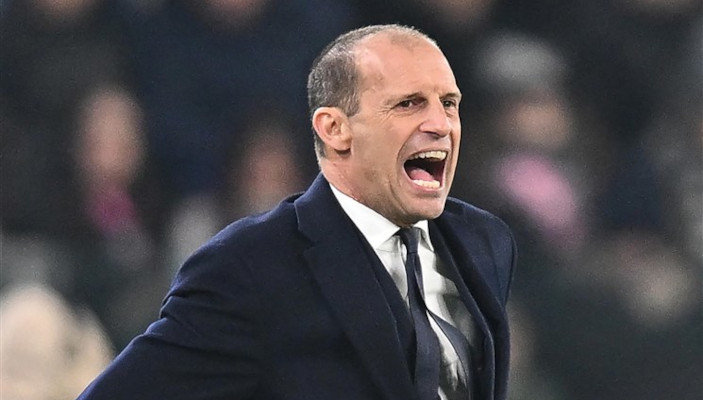Juventus missed three big chances on the pitch in their second consecutive trophyless campaign, proving that most players are not experienced enough and that the team struggles to follow coach Max Allegri, writes Lorenzo Bettoni.
When Juventus arrived at the Stadio Castellani on Monday night, they had 69 points, but by the end of the warmup, the tally had dropped to 59 seeing the Old Lady slip from second to seventh in the Serie A table.
It was the straw that broke the camel’s back. Juventus collapsed against strugglers Empoli, losing 4-1 in Tuscany and remaining five points below fourth-placed Milan with just two games remaining. It means it’s almost impossible to see the Bianconeri play Champions League football next season.
The FIGC ruling was announced shortly before kick-off and had a deadly impact on the team. Players simply switched off. Arek Milik gave away a penalty in the first half, Sebastiano Luperto squeezed past defenders to double Empoli’s lead, Alex Sandro and Moise Kean completed the job in the second half giving away the third and fourth goals.
Coach Massimiliano Allegri showed mixed feelings in his post-match interviews and, for the first time this season he looked distraught and overwhelmed by Juventus’ troubles off the pitch: “I am tired,” admitted the Livorno-born coach during a post-match press conference.
On paper, it was easy to predict the Bianconeri’s collapse. The same thing had happened in January when they suffered a 2-0 home loss to Monza days after a 15-point penalty which CONI would temporarily revoke a few months later.
Angel Di Maria admitted after that game that players were affected by the penalty imposed by FIGC, but, at the same time, Juventus slowly reacted on the pitch in the following weeks, winning several consecutive games in Serie A and gaining access to Coppa Italia and Europa League semi-finals.
It is perhaps Allegri’s biggest merit this season. Juventus didn’t sink after the original point deduction. The coach managed to isolate players from off-the-pitch issues. They had highs and lows, but in the end, the results were there.
However, in the most important moments of the campaign, Juventus switched off. It happened in the second-leg Coppa Italia semi-final against Inter when the Nerazzurri dominated at San Siro, earning a 1-0 win. It continued on European soil last week. Dusan Vlahovic had put the Old Lady ahead in Sevilla with barely 25 minutes remaining after a 1-1 draw in Turin, but the Bianconeri conceded the equaliser a few minutes later and eventually lost the game and the chance to play the Europa League Final against José Mourinho’s Roma.
New game, same scenario. Despite the fresh point deduction, Juventus could have still qualified for the Champions League by winning the last three games of the season in Serie A, against Empoli, Milan and Udinese. However, when they needed one last push to cross the finish line, the team crumbled.
Allegri used the lack of experience to partially explain their Europa League exit. Nevertheless, although the Bianconeri have many emerging talents in their team, from Fabio Miretti to Nicolò Fagioli and Samuel Iling-Junior, it is also true that many other stars have enough games under their belt to play big games.
Angel Di Maria, Filip Kostic, and Juan Cuadrado, just to name a few, have been regular starters this season, especially from January. Federico Chiesa was crowned European champion with Italy less than two years ago playing a key role under Roberto Mancini. Leonardo Bonucci, despite being often out of action due to injuries this term, remains a crucial piece of the dressing room and Wojciech Szczęsny has played many big games for club and country during his career.
So, how to explain Juventus’ collapses in key games this term? The answer is perhaps easier than many think. The club’s motto ‘To win is not important but is the only thing that matters’ has been overshadowed since January with the Old Lady using ‘united’ on their social media as a way to regroup and face adversities off the pitch as a unit.
Players would always gather, hugging each other before every game, but the same unity was not always visible on the pitch. Cuadrado and Szczesny were critical of Allegri’s choices before and after the second-leg semi-final against Sevilla last week. Chiesa and Dusan Vlahovic clearly feel uncomfortable on the pitch, Adrien Rabiot, who remains Juventus’ best performer this season, and Angel Di Maria have contracts expiring this coming June and are expected to leave in the summer. All the tension, the tiredness and the fatigue of such a demanding campaign exploded at the Castellani on Monday night, probably preventing Juventus from reaching the top four.
The Bianconeri now have two games remaining and need to remain in the top seven to end the season with a European placement in their hands. They could be given a new point penalty, which may be valid for this or next season. However, if UEFA ban the club from European competitions, it will apply only once they qualify for Champions, Europa or Conference League. This means that if they slip out of the top seven this term and UEFA exclude them from European tournaments, the ban won’t apply next season because they wouldn’t play in Europe anyway.
The future doesn’t look bright for the Bianconeri who need to restructure the sporting area and a big portion of the team, probably selling some of their biggest assets. The first target will be to rebuild the team’s unity with a group of players that go in the same direction, something that hasn’t always happened this term. Time will tell if Allegri is the right man for the job, especially considering that several members of the team are unhappy with his management and have done nothing to hide their frustration on the pitch.
@lorebetto

